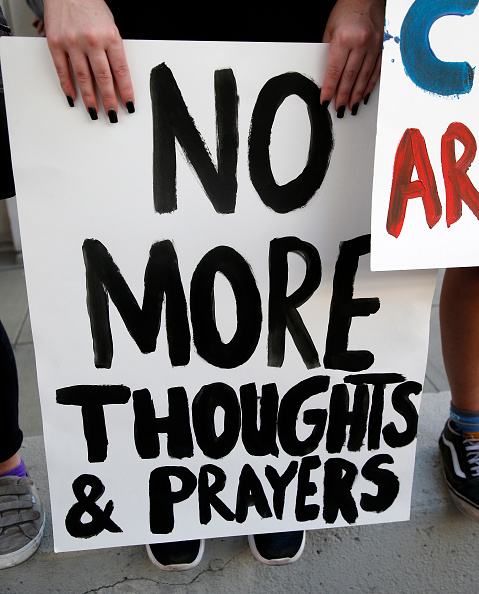Russian bots began working to divide Americans over gun control an hour after the Parkland shooting


Russian bots took advantage of America's divisions over gun control and the Second Amendment within an hour of the school shooting in Parkland, Florida, last week, The New York Times reports.
After initial reports of the attack, hundreds of posts from Twitter accounts linked to Russia ignited rumors that the suspected gunman, Nikolas Cruz, had Googled Arabic phrases before the attack. The accounts also jumped on hashtags like #Parklandshooting, #AR15, and #NRA while other bots pushed for #guncontrolnow and #gunreformnow. "This is pretty typical for them, to hop on breaking news like this," explained New Knowledge's Jonathon Morgan, who works to track disinformation campaigns. "The bots focus on anything that is divisive for Americans. Almost systematically."
The bots used similar tactics during the presidential election, pushing support for Donald Trump and Sen. Bernie Sanders and stoking Islamophobia and debates over immigration. The strategy appears to involve nudging ideas that would otherwise remain on the fringes "slightly more mainstream," Morgan added.
The Week
Escape your echo chamber. Get the facts behind the news, plus analysis from multiple perspectives.

Sign up for The Week's Free Newsletters
From our morning news briefing to a weekly Good News Newsletter, get the best of The Week delivered directly to your inbox.
From our morning news briefing to a weekly Good News Newsletter, get the best of The Week delivered directly to your inbox.
The Russia-linked accounts that jumped on the Parkland shooting have since moved on to the hashtag #falseflag, pushing a conspiracy theory that the shooting never took place. The bots are "going to find any contentious issue, and instead of making it an opportunity for compromise and negotiation, they turn it into an unsolvable issue bubbling with frustration," explained media professor Karen North. "It just heightens that frustration and anger."
A free daily email with the biggest news stories of the day – and the best features from TheWeek.com
Jeva Lange was the executive editor at TheWeek.com. She formerly served as The Week's deputy editor and culture critic. She is also a contributor to Screen Slate, and her writing has appeared in The New York Daily News, The Awl, Vice, and Gothamist, among other publications. Jeva lives in New York City. Follow her on Twitter.
-
 Will Peter Mandelson and Andrew testify to US Congress?
Will Peter Mandelson and Andrew testify to US Congress?Today's Big Question Could political pressure overcome legal obstacles and force either man to give evidence over their relationship with Jeffrey Epstein?
-
 Moltbook: the AI social media platform with no humans allowed
Moltbook: the AI social media platform with no humans allowedThe Explainer From ‘gripes’ about human programmers to creating new religions, the new AI-only network could bring us closer to the point of ‘singularity’
-
 Metal-based compounds may be the future of antibiotics
Metal-based compounds may be the future of antibioticsUnder the radar Robots can help develop them
-
 ABC News to pay $15M in Trump defamation suit
ABC News to pay $15M in Trump defamation suitSpeed Read The lawsuit stemmed from George Stephanopoulos' on-air assertion that Trump was found liable for raping writer E. Jean Carroll
-
 Judge blocks Louisiana 10 Commandments law
Judge blocks Louisiana 10 Commandments lawSpeed Read U.S. District Judge John deGravelles ruled that a law ordering schools to display the Ten Commandments in classrooms was unconstitutional
-
 ATF finalizes rule to close 'gun show loophole'
ATF finalizes rule to close 'gun show loophole'Speed Read Biden moves to expand background checks for gun buyers
-
 Hong Kong passes tough new security law
Hong Kong passes tough new security lawSpeed Read It will allow the government to further suppress all forms of dissent
-
 France enshrines abortion rights in constitution
France enshrines abortion rights in constitutionspeed read It became the first country to make abortion a constitutional right
-
 Texas executes man despite contested evidence
Texas executes man despite contested evidenceSpeed Read Texas rejected calls for a rehearing of Ivan Cantu's case amid recanted testimony and allegations of suppressed exculpatory evidence
-
 Supreme Court wary of state social media regulations
Supreme Court wary of state social media regulationsSpeed Read A majority of justices appeared skeptical that Texas and Florida were lawfully protecting the free speech rights of users
-
 Greece legalizes same-sex marriage
Greece legalizes same-sex marriageSpeed Read Greece becomes the first Orthodox Christian country to enshrine marriage equality in law
